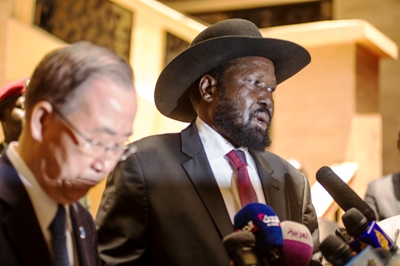UN chief demands special tribunal on crimes in S. Sudan
May 12, 2013 (JUBA) – The United Nations secretary-general, Ban Ki-Moon, proposed that a hybrid tribunal with international involvement be set up to investigate crimes against humanity committed in South Sudan.

“A special or hybrid tribunal with international involvement should be considered”.
A human rights report released by the UN Mission in South Sudan (UNMISS) last week accused both government forces and the country’s rebels committing atrocities against innocent civilians the ongoing conflict in the new nation enters its fifth month.
“The two leaders must recommit to inclusive nation-building that involves all political leaders and civil society. That means addressing the root causes of the conflict,” Ban said at the security council briefing.
“They must cease a senseless power struggle and restore the sense of national unity that prevailed at the time of independence”, he said.
South Sudan president Salva Kiir and his former deputy-turned rebel leader, Riek Machar on Friday signed a peace agreement seeking to end the country’s conflict. The deal followed a visit to the South Sudan capital, Juba by the US secretary of state, John Kerry who warned of possible “genocide” should the conflict continue.
Ban also welcomed the ceasefire agreement signed in Addis Ababa on Friday and commended the mediation role of the Intergovernmental Authority on Development (IGAD), which is chaired by Ethiopia’s prime minister.
“I call on the international community to continue to support IGAD’s efforts”, he said.
Since the crisis began five months ago, Ban said, thousands of South Sudanese have been killed, atrocities have been committed by both sides, more than a million people displaced, and nearly five million more need humanitarian assistance.
“If the conflict continues, half of South Sudan’s 12 million people will either be displaced internally, refugees abroad, starving or dead by the year’s end”, he warned.
Ban also reiterated the need to “immediately” halt fighting to enable people go back to their land to plant crops amidst looming hunger and malnutrition fears in the country.
“If this planting window is missed, there will be a real risk of famine. That is why we are calling for 30 days of tranquility backed by both sides. I am troubled by the accusations by both sides of breaches of the ceasefire already, and I urge maximum restraint by all parties,” said the UN secretary general.
HUMANITARIAN ACCESS
Both sides, he said, must fulfill their commitment by allowing humanitarian access– by air, by road and, in particular, by barge along the Nile River.
The UN has launched a massive operation to help 3.2 million people, but reportedly lacks resources. The humanitarian community, Ban told the UNSC, is $781 million short of the $1.27 billion it estimates as needed by the middle of this year.
“I urge all countries to support the forthcoming May 20 donor conference on South Sudan being hosted by Norway and the United Nations”, he said.
TRIBUNAL WELCOMED
Edmund Yakani, the executive director of Community Empowerment for Progress Organisation (CEPO) strongly supports the UN secretary general’s proposed tribunal.
“It is remarkable that if the idea [of the special tribunal] is executed, the human atrocities committed in South Sudan require no compromise. Justice and accountability on the human rights [abuses] witnessed is non-negotiable”, Yakani told Sudan Tribune Tuesday.
“The UNSG (UN secretary general) should speed up the process before evidence is hidden by the suspected perpetrators,” he added.
(ST)
